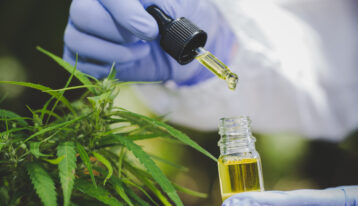By Sandy Baker
Oxycodone is a powerful painkiller commonly prescribed by doctors to treat moderate to severe pain from surgical procedures, disease, or injury. Like other opioids, this drug is typically used for the shortest amount of time possible and in the smallest dose to help reduce the risk of addiction-forming. Yet for some, addiction and dependence form, making it difficult to stop using.
Overdose Risk
The National Institute on Drug Abuse states that nearly 50,000 people in the U.S. died in 2019 from opioid-related overdoses. Oxycodone is one of the drugs commonly used during overdoses. About 21 to 29 percent of people who are given prescription opioids like this for chronic pain end up misusing them, and about 8 to 12 percent develop an opioid use disorder.
Considering the risks oxycodone creates to a person’s health, it’s essential to understand what this drug is and how addiction to it forms.
How an Oxycodone Prescription Can Cause Addiction
Oxycodone, often just called oxy, is a powerful but highly effective drug. Doctors often use it for severe cases of pain, such as the pain of cancer or a severe injury. If a person takes the drug as prescribed and limits use beyond what is needed, addiction is less likely to occur.
A person misusing this drug may start showing the following signs of addiction:
- Taking more of the drug than a doctor prescribes
- Using someone else’s prescription
- Using the drug to seek out the euphoric experiences it creates
- Feeling withdrawal symptoms when they stop using it
- Needing to use more of the drug over time to get the same results
- Not feeling good when they stop using it
Over time, the body and brain become dependent on the drug. When a person stops using it, they feel bad, and, in some cases, may engage in reckless behavior to get more of it. Without professional opioid addiction treatment, they may struggle to recover on their own.
Understanding the Science Behind the Addiction
Oxycodone, sold under brand names such as Percocet and OxyContin, works to stop pain signals from traveling from the injured area to the brain and central nervous system. In the process, the drug creates a euphoric, pleasurable feeling. As a result, the brain begins to appreciate that pleasure and seek it out over and over again. Since everyone’s brain is wired to seek out good feelings and things that seem enjoyable, the brain “learns” that oxycodone creates a good experience and therefore craves more of it.
Over time, the brain becomes so dependent on the drug that the body requires it to feel normal. When someone who is dependent on the drug stops using it, they feel intense cravings and physical pain. This can become so debilitating that it impacts social relationships, physical health, mental well-being, and the ability to work or go to school.
You’re not alone in your addiction, as the opioid epidemic shows. But help is available to get you through it.
What to Do If Addiction Occurs
If you suspect you or your loved one is battling addiction to oxycodone, you may be unable to stop using it on your own. The first step is to reach out to the prescribing doctor to find an alternative to manage pain. Then, consider a few steps.
Consider the Benefit of Detox
Many people with an addiction to opioids benefit from professional detox. During this process, the body rids itself of the drug while the brain works through the intense feelings of withdrawal and cravings. Medical professionals ensure a safe environment that alleviates some of the more uncomfortable symptoms while giving your body the nutrients it needs to function.
Consider long-term treatment
After detoxing, spending some time in residential treatment may help you to work through the damage addiction creates in relationships, work, and day-to-day life. You’ll learn why the addiction happened and how to prevent it from occurring again.
Some people who do not need detox may be able to start with an intensive outpatient program (IOP) or other forms of treatment. The key is to empower yourself by getting into therapy as soon as possible. To get started on the path to healing.
We Can Help
At The Ranch at Dove Tree, we work with many people battling addiction to opioid-based prescription medications. No matter what set you on this path of addiction, there is ample help and support available to you right here in our program. We can help you rebuild your life when you take that first step towards treatment.








